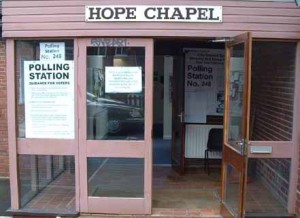Salma Yaqoob is surely the most refreshing thing to happen to politics in Birmingham over the last decade or more.
Her coherent, articulate views have found an audience amongst those frustrated by the similarity of the policies offered by the three main parties. Having narrowly failed to win Hall Green for Respect (the party which she leads) at the 2010 General Election, Salma stepped down last year as a councillor for Sparkbrook and has subsequently expressed her disillusionment with Birmingham’s political system.
This week Salma Yaqoob has made a belated, and interesting, intervention into Birmingham’s mayoral referendum campaign, in the process lifting the debate above the level in which it has usually been mired. The essence of her argument is that voting for a mayor offers the best (and perhaps only) prospect of breaking the stranglehold of established party dominance over the city’s politics, of countering the cosy consensus, the deals done behind the scenes. She proposes an alliance of ‘progressive’ parties and individuals to challenge for the post of mayor, campaigning on an anti-cuts, anti-austerity manifesto. You can read more of Salma Yaqoob’s arguments here.
However, whilst these arguments contain a degree of emotional appeal, we do not believe that they stand up to forensic interrogation.
The prospects of an independent or ‘progressive’ mayoral candidate’ (i.e. Respect/Green) winning in Birmingham seems unrealistic. The city’s electorate totals around 720,000 and a 50% turnout (which one might reasonably expect) means that there would be 360,000 votes to be contested. The winning candidate will probably need to secure around one-third of these (120,000) to become mayor. Do not underestimate how tall an order that would be. The cumulative total of votes cast for both the Respect and Green parties in Birmingham at the 2010 General Election was only 15,173 and although neither party fields candidates across anything like the whole city, they do field them in the constituencies where they most expect to perform well. Despite this it is unlikely that there will be a Green Party councillor in Birmingham come Friday (Respect aren’t even fielding candidates, choosing instead to lend support to Green Party candidates).
By contrast, Labour, the Conservatives and the Liberal Democrats have sophisticated, well organised party machines, with decades of experience in campaigning and the financial wherewithal to do so. Their traditional support is often based around not only political affiliations, but also community, familial and even religious allegiances. Indeed, anyone who has studied the recent history of Birmingham’s politics will know that in certain wards clan-based loyalties can also be decisive.
The mayoral system, designed in Whitehall, has been engineered to entrench the positions of the political establishment. Independent candidates succeeded in Middlesborough, Hartlepool, Doncaster and even (for one term only) London. But that London aberration aside, the overwhelming evidence is that the larger the electorate, the higher the bar over which the independent and non-mainstream candidates have to jump.
Should a ‘progressive’ mayor succeed in jumping that bar, their problems would only just be starting. A Birmingham ‘progressive’ mayor (elected on an anti-austerity, anti-cuts manifesto) has to open negotiations with Westminster over the extent of their ‘City Deal’, the additional package of powers to be devolved to both mayoral or (as Manchester has already demonstrated) non-mayoral cities. Evidence indicates that such deals will be very modest and will give mayors only very limited powers to raise local revenues and will not include key areas such as education, health, transport or policing. However, their scale is also dependent upon a city showing that it can deliver: ‘strong leadership, complemented by clear accountability to local people’ (which gives central government plenty of room to deny a ‘progressive’ mayor anything more substantial).
But perhaps a Birmingham ‘progressive’ mayor’s biggest problems lie within the council chamber. With no ‘progressive’ councillors, even forming a Cabinet may prove difficult, and would require negotiations and deals to be cut with at least one mainstream party, inevitably involving the watering down or breaking of manifesto pledges (at this point we recommend Googling the words ‘Liberal Democrats, coalition government agreement’).
Then comes the issue of how a ‘progressive’ mayor gets their annual budget and strategic policies through council, not just once, but for four years. For a mayor with large party backing, the one-third level of councillor support needed for this is easy; for a mayor with no obvious allies (and lots of enemies) amongst the ranks of councillors, it’s a mountain only climbed at the expense of further manifesto retractions or compromises.
‘Yes’ campaigners might argue that the mayor would have a direct mandate from Birmingham citizens, meaning that councillors from rival parties would be forced to give way. But those 120 directly elected councillors have (based on votes cast for the current councillors) a combined mandate of around 440,000 votes (though it can be argued that this figure should be divided by three – giving 143,000 – as voters elect up to three councillors). Suddenly that mayoral mandate looks much less impressive and the politically astute and experienced mainstream party leaders will seize on the point and either wring further concessions from a ‘progressive’ mayor or hang them out to dry.
Depressing and sobering it might be, but Salma Yaqoob’s heroic idealism seems more like an act of desperation. It’s like trying a shot from the half way line against a well-organised defence. If she can’t score then we are saddled with the mayoral system from which there is almost no escape and for no obvious benefit.
As we have consistently argued, the proposed mayoral system, so bereft of the normal checks and balances of democracy, cannot be placed into the hands of Birmingham’s current ruling political elite, the complacency of whose leaders is largely to blame for the disillusionment of one of the city’s brightest politicians.
The Birmingham Press came late to the mayoral debate (but none of us are paid journalists and we all have jobs outside of this website), but since we engaged fully with the issues we have met several people who have visions and ideas for reforming and democratising Birmingham’s politics, that we hope will not wither whatever the referendum’s outcome. From a return to Committees (allowed for under the Localism Act 2011, but only if we vote ‘No’ to a mayor), the development of non-party community councils, introducing a form of proportional representation for local elections, Salma Yaqoob’s own call to pay councillors a living wage, that they may do their job full time. These and many other ideas must be allowed to surface, be scrutinised and be implemented.
Changes will not come quickly, but the Bradford Spring will not turn into the Birmingham Autumn. Long-term change (and it really is ‘Change We Need’) can’t be achieved by simply replacing the person at the top, while their acolytes and party apparatus remains in place. A successful revolution starts at the street, plants roots and eats away at the decaying structure (sometimes quickly, sometimes slowly), until the system collapses.
For those with the drive and the energy to attack the failings in our political system, The Birmingham Press will continue to provide a platform, whatever direction the city chooses on Thursday.




